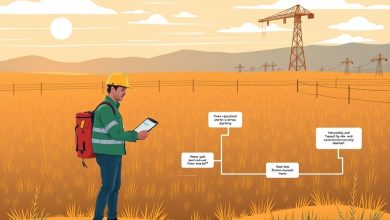Field Service Management Mitigating Technician Fatigue for Enhanced Operational Efficiency

Introduction
In today’s fast-paced world of field service management, technicians often find themselves juggling multiple tasks while navigating challenging work environments. This can lead to increased stress levels and fatigue, ultimately affecting job performance and overall well-being. As a field service manager, it’s crucial to implement effective strategies to manage technician fatigue and ensure optimal productivity.
Understanding Technician Fatigue
Technician fatigue refers to the physical and mental exhaustion experienced by workers in field service roles. This condition can arise from various factors, including:
• Long hours spent away from home base
• Frequent travel between job sites
• Physical demands of the job
• Mental strain from managing customer expectations
• Lack of proper rest breaks during long shifts
Understanding the root causes of fatigue is essential for developing targeted solutions to address this critical issue.
The Impact of Fatigue on Field Service Operations
Fatigued technicians can negatively impact field service operations in several ways:
- Decreased efficiency: Exhausted workers may struggle to complete tasks quickly and accurately.
- Increased errors: Fatigue can impair judgment and decision-making skills.
- Reduced job satisfaction: Overworked technicians may feel undervalued and demotivated.
- Higher turnover rates: Chronic fatigue can lead to burnout and employee attrition.
- Negative customer experiences: Tired technicians may appear less professional or responsive to customers’ needs.
By acknowledging these consequences, field service managers can prioritize fatigue management as a key aspect of operational success.
Strategies for Managing Technician Fatigue
Implementing effective fatigue management strategies is crucial for maintaining high-performing teams. Here are some approaches that field service managers can consider:
Flexible Scheduling
One of the most impactful ways to combat fatigue is through flexible scheduling:
• Implement rotating shifts to allow for regular breaks and time off
• Offer compressed workweeks to reduce the number of days worked
• Provide more frequent shorter breaks throughout the day
• Encourage work-from-home options when possible
Flexible scheduling allows technicians to better balance their work and personal life, potentially reducing overall fatigue levels.
Proper Rest Breaks
Ensuring adequate rest breaks is vital for maintaining alertness and preventing fatigue:
• Mandate regular 15-minute breaks every hour
• Provide longer lunch breaks (30 minutes to 1 hour) mid-shift
• Ensure technicians have access to comfortable break rooms with amenities like refrigerators and microwaves
• Promote relaxation techniques during breaks, such as meditation or deep breathing exercises
These measures help technicians recharge and maintain focus throughout their workday.
Ergonomic Equipment and Workspace Design
Investing in ergonomic equipment and workspace design can significantly reduce physical fatigue:
• Provide lightweight, ergonomic tools designed for comfort
• Ensure vehicles are equipped with supportive seating and proper ventilation
• Create well-lit, climate-controlled workspaces when possible
• Implement anti-fatigue mats and ergonomic chair options for office-based staff
By minimizing physical discomfort, technicians are better able to focus on their tasks without the added burden of physical strain.
Technology Solutions
Leveraging technology can play a significant role in fatigue management:
• Implement mobile apps that track work hours, breaks, and travel times
• Utilize GPS tracking to optimize routes and minimize unnecessary travel
• Integrate wearable devices that monitor heart rate and other biometric data
• Develop AI-powered systems that predict fatigue levels based on historical data and current conditions
Technology can provide valuable insights and support in identifying and addressing fatigue-related issues.
Training and Education
Educating both technicians and managers about fatigue management is crucial:
• Conduct workshops on recognizing signs of fatigue and its effects
• Train supervisors to identify fatigued employees and intervene appropriately
• Provide resources for stress management and self-care practices
• Regularly review and update policies related to work hours and breaks
Empowering all team members with knowledge about fatigue management promotes a culture of awareness and support.
Performance Monitoring and Feedback
Regular monitoring and feedback systems can help identify and address fatigue issues:
• Implement anonymous feedback mechanisms for technicians to report concerns
• Conduct regular check-ins with team members to discuss workload and well-being
• Analyze performance metrics to identify patterns of fatigue-related issues
• Provide constructive feedback and coaching to improve work habits and reduce fatigue
By fostering open communication and continuous improvement, field service managers can create a more supportive work environment.
Conclusion
Managing technician fatigue is not just a moral imperative; it’s also a strategic necessity for successful field service operations. By implementing a combination of flexible scheduling, proper rest breaks, ergonomic equipment, technological solutions, training programs, and performance monitoring, field service managers can significantly reduce fatigue levels among their technicians.
Remember, investing in your team’s well-being is investing in your company’s future. By prioritizing fatigue management, you’ll see improvements in productivity, job satisfaction, and ultimately, customer satisfaction. Don’t let fatigue become a hidden threat to your field service operation – take proactive steps today to create a healthier, more efficient workforce.
As a field service manager, you have the power to transform your team’s work experience and set them up for long-term success. Start implementing these strategies now and watch your technicians thrive in their roles, leading to improved operational efficiency and customer satisfaction.




